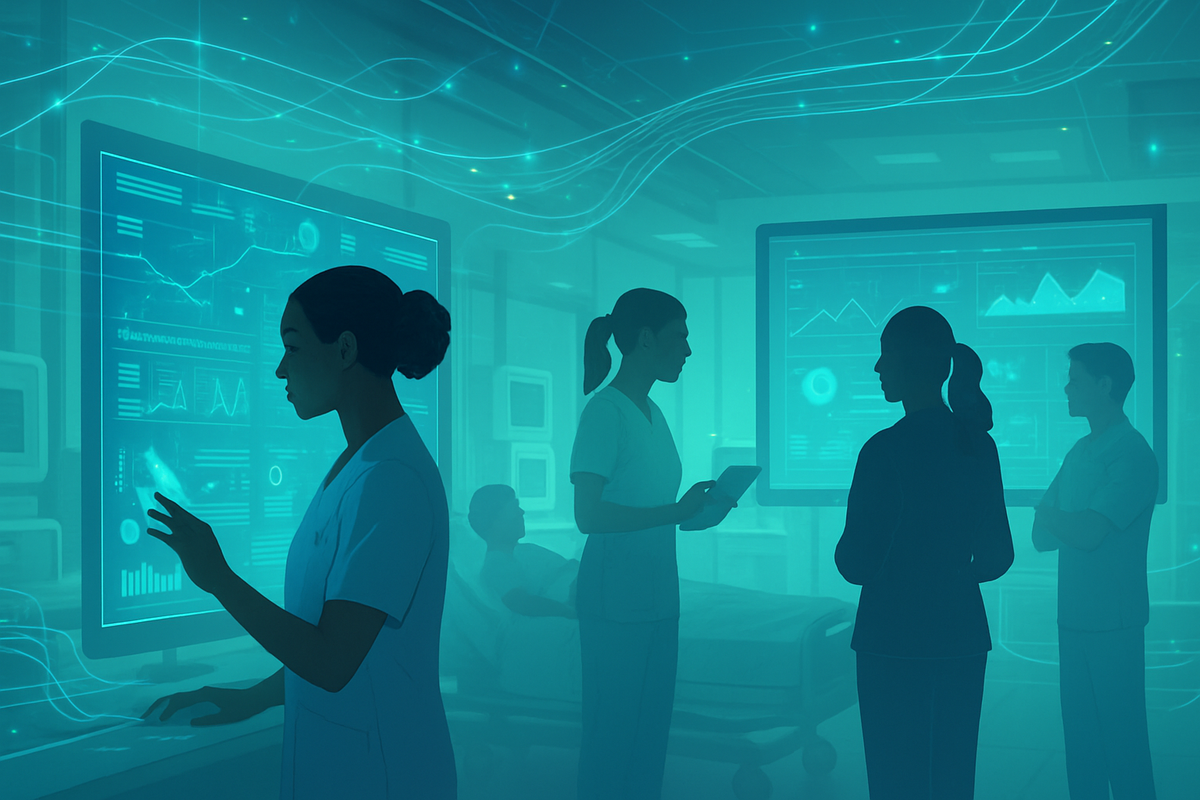
The healthcare sector is in the midst of an unprecedented digital transformation, a sweeping change driven by rapid technological advancements and an increasing demand for more efficient, accessible, and patient-centric care. At the heart of this revolution lies nursing informatics, a specialized field integrating nursing science, information science, and computer science to optimize data management and communication within healthcare. Guiding this complex evolution are Chief Nursing Informatics Officers (CNIOs), strategic leaders who bridge the critical gap between clinical nursing practice and information technology, ensuring that digital solutions truly serve the needs of both patients and frontline clinicians.
This profound shift carries immediate and significant implications for the healthcare market. The global digital transformation in healthcare market, valued at an estimated US$65.2 billion in 2023, is projected to surge to US$253.6 billion by 2033, and around US$351.71 billion by 2035. This explosive growth signals a massive wave of investment and innovation, creating fertile ground for technology providers and presenting both opportunities and challenges for established healthcare systems and public companies across the entire ecosystem. As of September 29, 2025, the industry is keenly observing how these strategic appointments and technological integrations will reshape care delivery and financial performance.
The Confluence of Care and Code: A Detailed Look at the Transformation
The journey towards a digitally integrated healthcare system has been steadily building, with significant acceleration spurred by the recent global health crises. The evolution of nursing informatics, from a nascent specialty to a pivotal executive function, mirrors the increasing reliance on data and technology in clinical practice. Initially focused on the implementation of Electronic Health Records (EHRs), the scope of nursing informatics has expanded dramatically to encompass telehealth, remote patient monitoring, artificial intelligence (AI), machine learning (ML), and big data analytics.
Key milestones leading to this current moment include the widespread adoption of EHRs in the early 2010s, which digitized patient data and laid the groundwork for advanced analytics. The COVID-19 pandemic, however, proved to be a catalyst, normalizing telehealth and remote monitoring solutions almost overnight. This rapid adoption highlighted both the potential and the pitfalls of technology in healthcare, particularly the critical need for systems that are intuitive, interoperable, and clinically relevant. This environment underscored the necessity of leaders who understand both clinical workflows and technological capabilities, leading to the strategic elevation of the Chief Nursing Informatics Officer role.
Key players and stakeholders in this transformation are diverse. They include major healthcare systems and hospitals, governmental health agencies, nursing professional organizations like the American Nurses Association (ANA) and the American Medical Informatics Association (AMIA), and a burgeoning array of healthcare technology companies. Publicly traded EHR vendors such as Oracle (NYSE: ORCL) (following its acquisition of Cerner) and private giants like Epic Systems, alongside telehealth providers and AI solution developers, are central to providing the tools for this transformation. The initial market reaction has been overwhelmingly positive for companies positioned to deliver these digital solutions, with significant investment flowing into health tech startups and established players alike. However, there's also a growing recognition that successful implementation hinges on clinician buy-in and effective integration, areas where CNIOs are proving indispensable.
Market Movers: Companies Poised for Gains and Facing Challenges
The digital transformation in healthcare, spearheaded by advancements in nursing informatics and the strategic guidance of CNIOs, is creating a clear delineation between potential winners and losers in the financial markets. Companies that are agile, innovative, and deeply integrated into the digital health ecosystem stand to gain significantly, while those slow to adapt or offering outdated solutions may struggle.
On the winning side, healthcare technology providers are at the forefront. Companies specializing in EHR systems, even mature ones like Oracle (NYSE: ORCL) with its Cerner acquisition, are continuously evolving their platforms to incorporate advanced analytics, AI, and user-friendly interfaces, often guided by CNIO feedback. Telehealth platform providers such as Teladoc Health (NYSE: TDOC) and Amwell (NYSE: AMWL) are experiencing sustained demand as virtual care becomes a permanent fixture. Companies developing AI and machine learning solutions for diagnostics, predictive analytics, and personalized medicine are seeing substantial growth, as are firms in cloud computing and big data analytics that enable the processing of vast healthcare datasets. These companies benefit directly from the increased investment in digital infrastructure and solutions, often championed by CNIOs seeking to optimize clinical workflows and patient outcomes.
Conversely, companies that might face challenges include those with legacy IT systems that are difficult to integrate or update, or those offering hardware-centric solutions without a clear digital integration strategy. Traditional medical device manufacturers that fail to embed smart, IoT-enabled capabilities into their products, or to provide seamless data flow to EHRs, could see their market share erode. Furthermore, healthcare providers—publicly traded hospital chains or health systems—that are slow to embrace digital transformation may incur higher operational costs, experience lower patient satisfaction, and struggle to compete with more technologically advanced peers. Cybersecurity firms, while essential, face the continuous challenge of evolving threats; companies that fail to provide robust, cutting-edge security solutions for sensitive patient data could lose credibility and market share in this high-stakes environment.
A Wider Lens: Broader Trends and Strategic Implications
The ascendancy of nursing informatics and the CNIO role is not an isolated event but rather a critical component of several overarching trends reshaping the entire healthcare industry. This digital pivot aligns perfectly with the broader movement towards value-based care, where outcomes and efficiency, rather than just service volume, dictate reimbursement. Digital tools, championed by informatics professionals, are essential for collecting the data needed to demonstrate value, improve care coordination, and manage population health effectively.
The ripple effects extend across the entire healthcare ecosystem. Competitors are compelled to accelerate their own digital strategies to avoid being left behind. Partnerships between traditional healthcare providers and technology companies are becoming increasingly common, fostering innovation and creating new service delivery models. For instance, pharmaceutical companies are leveraging digital health data and AI for accelerated drug discovery and personalized treatment protocols, while insurance providers are using digital platforms to manage chronic diseases and promote preventative care. Regulatory bodies are also adapting, with agencies like the FDA grappling with how to regulate AI-driven diagnostics and digital therapeutics, and HIPAA compliance becoming even more stringent with increased data flow. Historically, the adoption of EHRs faced significant resistance and implementation challenges, but the current wave of digital transformation is different; it's driven by a more mature understanding of technology's potential and a strategic, clinically-informed approach led by roles like the CNIO, rather than a top-down IT mandate.
The Road Ahead: Navigating the Next Wave of Digital Health
Looking ahead, the digital transformation in healthcare, with nursing informatics at its core, promises a dynamic and evolving landscape. In the short term, we can expect continued aggressive investment in interoperability solutions, as healthcare systems strive to break down data silos and create a unified patient record across different platforms and providers. The role of CNIOs will become even more critical in advocating for open standards and seamless data exchange. We will also likely see a further expansion of virtual nursing models, addressing workforce shortages and leveraging technology to deliver care remotely, efficiently, and effectively.
Long-term possibilities include the widespread adoption of predictive analytics to anticipate patient deterioration and intervene proactively, truly personalized medicine guided by AI, and healthcare delivery models that are far more decentralized and patient-centric. Strategic pivots will be necessary for many organizations; healthcare providers must move beyond simply implementing technology to truly integrating it into their care philosophy and operational DNA. This means fostering a culture of digital literacy among all staff, investing in continuous training, and empowering clinical leaders like CNIOs to drive innovation from within. Market opportunities will emerge in areas like specialized AI for clinical decision support, advanced cybersecurity for health data, and novel digital therapeutics. Challenges will undoubtedly include managing data privacy in an increasingly connected world, ensuring equitable access to digital health tools, and overcoming inherent human resistance to change. Potential scenarios range from a fully integrated, highly efficient, and patient-empowering healthcare system to one fragmented by technological disparities and regulatory hurdles.
Charting the Future: Key Takeaways and Investor Focus
The digital transformation sweeping through the healthcare sector, underscored by the burgeoning importance of nursing informatics and the strategic appointment of Chief Nursing Informatics Officers, represents a monumental shift in how care is delivered and managed. The key takeaway is clear: technology is no longer an auxiliary tool but a central pillar of modern healthcare, and clinical leadership in its adoption is paramount. CNIOs are not just IT liaisons; they are strategic architects ensuring that technological advancements translate into tangible improvements in patient safety, clinical efficiency, and overall care quality.
Moving forward, the market will continue its trajectory of significant growth in digital health solutions. Investors should assess companies based on their ability to innovate, their commitment to interoperability, and their capacity to integrate seamlessly into complex healthcare workflows. Watch for companies that demonstrate strong partnerships with healthcare providers and those whose products directly address the challenges and opportunities identified by clinical informatics leaders. The success of this transformation hinges on the delicate balance between technological prowess and clinical relevance, a balance that nursing informatics and CNIOs are uniquely positioned to maintain. The coming months will reveal which organizations are truly leading the charge, and which are merely following, in this exciting and critical evolution of healthcare.
This content is intended for informational purposes only and is not financial advice.





